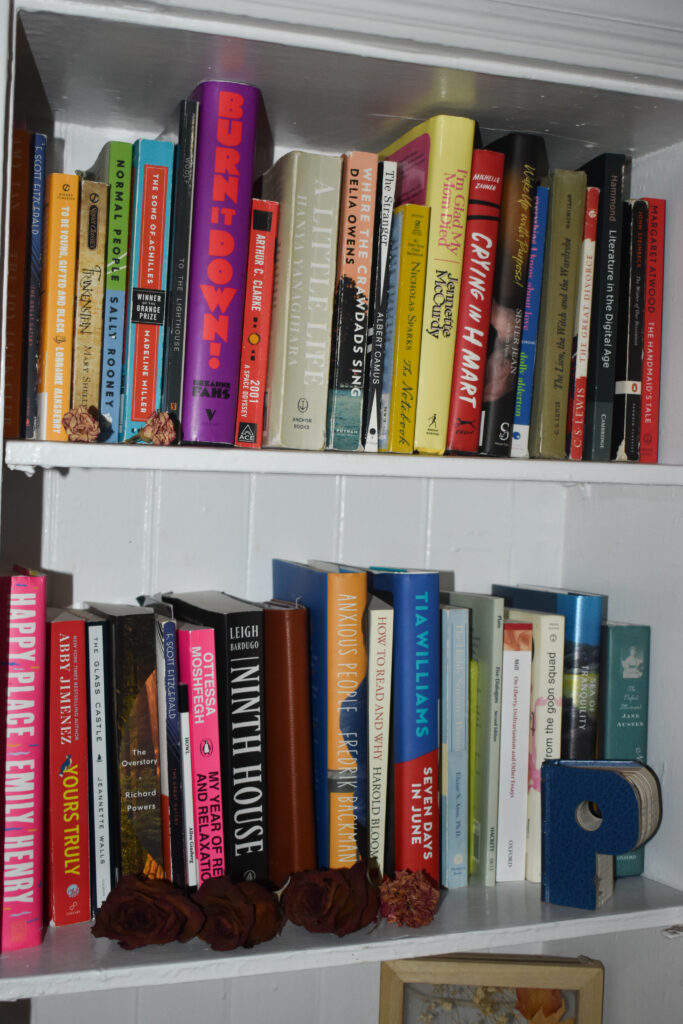Ushering in the fall season, Loyola Libraries hosted events to honor Banned Books Week.
Turning Pages: Loyola Honors Banned Books
As the golden leaves drift lazily through the crisp Chicago air, students embrace autumn with open arms. The season brings its scents of coffee, snuggly clothes and — most importantly — books.
At Loyola, the fall season was welcomed with a week dedicated to books that have been banned.
From Sept. 23 – Sept. 26, Loyola Libraries hosted a series of events celebrating Banned Books Week. Among the activities was a bookmark-making session and a “blind date with a banned book,” inviting students and faculty to engage with banned literature.
Students were encouraged to pick a book off the shelf, wrapped to conceal its identity, and read it to gain insight as to why it was banned. Some of the books that were concealed included “Lawn Boy” by Jonathan Evison, “Adventures of Huckleberry Finn: American Comic Vision” by David E.E. Sloane and “Of Mice and Men” by John Steinbeck.
Research and Learning Librarians Tori Golden and Easton Brundhae said the library’s events aimed to shed light on why banned books should be read.
“We’re seeing more banned books, so it’s becoming increasingly important to raise awareness,” Golden said.
Brundhae said banning classic literature also reflects ever-changing cultural values.
“Looking at the reasons behind book bannings allows us to see how our society is progressing or regressing,” Easton said. “Since the majority of books being banned had originally been taught in schools, professors assume that the students have read said books when, in fact, students couldn’t because there was a gap in the curriculum.”
He also urged students and faculty to take action by participating in local school board meetings and advocating for uncensored access to knowledge.
“These problems don’t just exist in a vacuum,” Easton said. “Sometimes when students are on campus, they think they’re in a bubble and they can forget how these topics extend to the community. Even simply picking a blind date book from our shelves can make a small change.”
As a private university, Loyola doesn’t face the same restraints when providing literature to students as public institutions do. Since private universities don’t generally receive federal funding or state support, Loyola has free reign in its literary decision-making. The books purchased for the library and implemented in the curriculum are unrestricted, according to Emma Heet, associate dean of Collection and Administrative Services.
In 2023, Governor Pritzker signed House Bill 2789 enacting the Library System Act, designed to protect libraries from restrictions to book collections. The bill made Illinois the first state to outlaw book bans, according to the Illinois General Assembly.

“We’re lucky because no one can tell us what to buy or not buy, so we simply buy everything to cater to everyone,” Heet said.
Loyola Libraries also aim to help students access a wide variety of literature through their collections and events, according to Golden.
“We have a great collection for students in the education and English programs,” Golden said. “At our bookmark-making event, we have sheets of paper about the books that are currently getting banned and how students can access them via our database.”
Book bans stifle the development and understanding of literature, fourth-year mathematics major Francesco Costanzo said.
“Banning books takes away safe, thought-out perspectives that have been thoroughly edited and revised,” Costanzo said.
Roughly half of books banned covered topics about the lived experiences of people of color or members of the LGBTQ+ community, according to data from the American Library Association.
Sawsan Abbadi, director of the Arabic Language and Culture minor, said the banning of books deprives students of the opportunity for critical analysis.
“How can we respond to misinformation if we don’t know what’s being said?” Abbadi said.
Banning books limits students’s opportunities to develop awareness and advocacy skills, according to Abbadi
In many cases, the reasons given for banning books include when the books cover themes or instances of violence, detailed sexual experiences, descriptions of sexual assault or discussion about race, according to Pen America, a free speech advocacy organization.
Book bans can also close off readers to stories about other cultures, Abbadi explained.
“If I want to be an advocate, I need to know what I’m advocating for,” Abbadi said. “Banning books continues to divide the East and West, and that’s a problem.”
Natalie Bremer, a first-year psychology major, listed several banned books she’s read, such as “The Giver,” “Of Mice and Men” and “The House on Mango Street.”
“It’s harder to be engaged with a topic if you can’t choose what to read,” Bremer said. “These books present important issues and should be read, discussed and understood to better grasp the world around us.”
Hale Carlsen, a fourth-year social work major, said reading books from different perspectives is an important facet of literature.
“It’s important for people from marginalized groups to have their voices heard and banning books silences those voices,” Carlsen said.
They also mentioned how restricting access to texts on critical race theory and other topics reinforces the status quo.
“It doesn’t leave room for identities that deviate from the norm,” Carlsen said
Golden and Easton encouraged students to engage with Loyola’s Banned Books Week annual events. They operate as a reminder of how censorship affects everyone, not solely within classroom settings, according to Easton.
Students can get involved with banned books by checking out the blind date with a book display on the first floor of Cudahy Library. Students can also check out the print-outs provided by the Information Commons to learn about what banned books are available at Loyola, why they were banned and how to check them out.
-

Noman is a first-year neuroscience and English double major. When not reviewing books or writing about music, Noman enjoys reading, writing poetry, drinking coffee, and watching Young Sheldon. She loves exploring new narratives and capturing the heart of campus stories with a focus on culture and the arts.
View all posts -

Topics
Get the Loyola Phoenix newsletter straight to your inbox!


